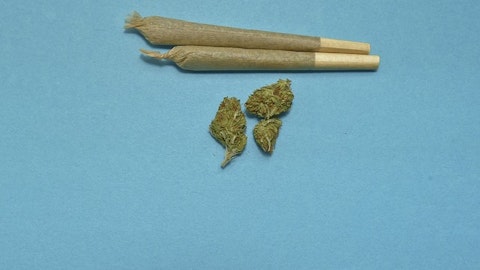William Toler: Yeah, I’ll start there. There’s really two sides of the inventory thing, both are trending in the right direction. We’ve reduced our total inventory in a two year period by close to $100 million. Some of that was inventory write-down, but the vast majority of that was simply getting inventories down to manageable and workable levels. And so we still think we have another bit to go. We’d like to be able to run this industry or this company on 90 days worth of inventory right now or at a higher number than that. And we think we’ve got probably $15 million, $20 million more we could take out of the total. So it’s a terrific thing. The other piece of inventory improvement from ’23 compared to ’22 is we had far, far, far less write-downs in ’23 compared to what we had in ’22 as we are — again, we’re dealing with the supply chain whipsaw from even back to COVID days and the industry high volume days back in ’20 and ’21.
So the inventory had gotten exaggerated in everybody’s balance sheets. So we worked all that down. So we didn’t have those sort of write-down issues in ’23. Don’t expect them again in ’24, which is great. Although you still have to manage it every quarter and every month and we do very, very aggressively to try and protect our balance sheet, protect our inventory investments.
John Lindeman: Maybe just — math to —
Harold Weber: Yeah. I’m sorry, go ahead.
John Lindeman: Yes. Just to add some math to what — to Bill’s comment there a second ago, you heard him say we’d love to manage the business on basically 90 days or one quarter’s worth of demand. We ended this past year 2023 with roughly $75 million worth of inventory. And over the last four quarters, we’ve been averaging about $56 million in sales. So clearly, you there’s real opportunity for us there and that’s why you hear us talking about sort of an ability to manage that further down into 2024.
Harold Weber: Okay. And regards to your — little bit of the cost cuts you’ve made and so forth, hopefully, we’re going to see a turn up. Business improved 20% and you’re going to be able to fulfil that without having to add back a bunch of those whatever course what you are going to, call it, layoffs, capacity, rightsizing whenever you like. I was thinking that based on where you are, you should be able to increase the business by — what do you think before having this ad spending back again?
William Toler: Well, you have some variable costs, obviously, with staffing in the DCs. But importantly, as we have come down in top line, we did not dramatically alter footprint. Still have six DCs in the US. We have two in Canada, and we have one over in Europe, and that was the footprint we had three years ago. What we’ve done instead is we’ve been subletting basic vacant space and underutilized space to allow us to provide them a service to others, if you will. And so we’re able to handle the volumes that we had back in ’21, ’22 or ’20 and ’21 very, very easily. We would have some costs on the way back up as you of course have more people touching more volume. But structurally, we’ve got our cost structure really screwed down now to where we can make money at these low levels, but also can scale up very quickly and be able to support our customers.
Harold Weber: So that would mean to me though that that’s going to happen that our margins should expand quite a bit based on a increase in overall revenue so the — spread the cost more, is that reasonable expectation?
William Toler: Absolutely. Let’s not forget that three years ago, we were roughly a 10% EBITDA business when things were growing and better. And we think that with our mix change toward the more profitable, powerful brands that are ours, that could be a very achievable number over time. We’re probably not going to get there anytime in the next 6 to 12 months, but I think as industry growth returns and we’re able to drive our profitable proprietary brands that we certainly have a really good position going forward.
Operator: As there are no further questions, I would now hand the conference over to Bill Toler for his closing comments. Bill?
William Toler: Thank you, Ryan, and we appreciate all of you being on the call this morning and thanks for your continued support of Hydrofarm. We look forward to speaking to you soon. Take care.
Operator: Thank you. The conference of Hydrofarm Holdings Group has now concluded. Thank you for your participation. You may now disconnect your lines.
Follow Hydrofarm Holdings Group Inc. (NASDAQ:HYFM)
Follow Hydrofarm Holdings Group Inc. (NASDAQ:HYFM)
Receive real-time insider trading and news alerts





